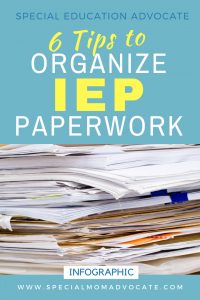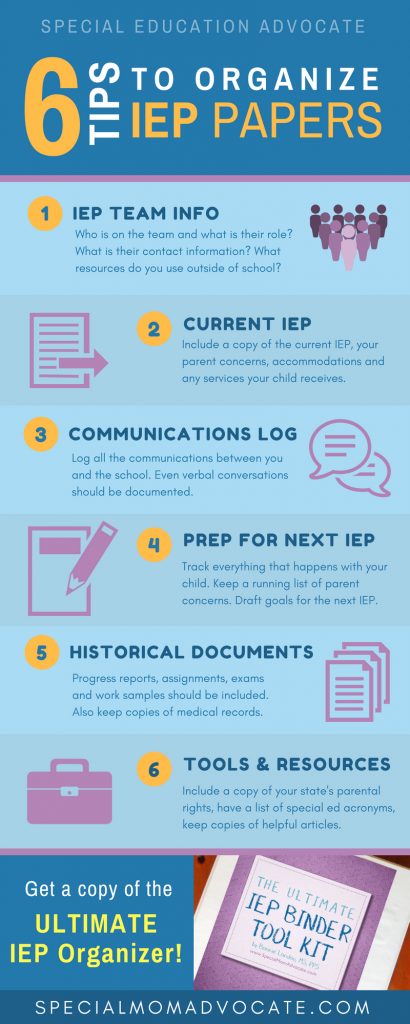 One of the most important things you can do when advocating for your child is to organize IEP paperwork! That is why I created the Ultimate IEP Binder Tool Kit, so parents like you can get all the information in one place.
One of the most important things you can do when advocating for your child is to organize IEP paperwork! That is why I created the Ultimate IEP Binder Tool Kit, so parents like you can get all the information in one place.
Why organize IEP paperwork?
In chapter 33 of my book, Special Ed Mom Survival Guide, I explain that having an IEP Organizer is critical because:
- School staff can deny they said or did things if you do not have documented proof.
- When in a meeting or proving a point, you want all your information right at your fingertips. Then you can pull it out and show them without having to hunt it down.
- When you organize IEP paperwork you can track your child’s progress (or lack of progress), showing patterns in the support your child is getting.
- You can plan what you are going to say or ask for at meetings.
When you aren’t organized, the school can take advantage of that.
The schools that avoid giving services are masterful at skirting the rules. The more together you are ahead of meetings, the better prepared you are to make sure they follow the laws they are suppose to. It’s unfortunately that you are put into the role of policing them, but honestly that is what a hired special education advocate does. We basically look at the process and the details and find where the school is deviating from the law. Then we point it out to them.
Get your PDF download of the Ultimate IEP Binder Tool Kit!
Top 6 Tips for Getting Organized!
I created the following infographic to help you figure out the most critical pieces of information to organize IEP paperwork. In 6 sections of a notebook, you can put together:
- All the contact information for the IEP team.
- All the paperwork, notes and concerns around the current IEP.
- A communication log with copies of ALL communication. This includes follow up emails to staff members you have verbal conversations with. This is critically important to confirm what was said so you have documentation.
- All the information you have gathered as you prep for the next IEP. This includes notes, work samples and parent concerns.
- Historical documents related to your child, including medical records, private assessments and previous work.
- Tools and resources that are helpful as an advocate for your child. This might include a list of special education acronyms, articles that support your point of view or your state’s parental rights.
NOTE TO BLOGGERS: Feel free to post this infographic on your website, but please link back to this website so proper credit is given. Thanks!
ABOUT THE AUTHOR:
Bonnie Landau is a professional counselor and holistic therapist in Ventura County, California. Her specialities include therapy for autism, therapy for ADHD, and therapy for parenting who have kids with autism or ADHD or other neurodivergence. She changed careers from graphic design to counseling with the goal of helping struggling parents of kids with ADHD, autism, or other neurodivergence find strategies and solutions to help their children succeed. Bonnie is also the author of Special Ed Mom Survival Guide: How to Prevail in the Special Education Process and Find Life-long Strategies for You and Your Child.




